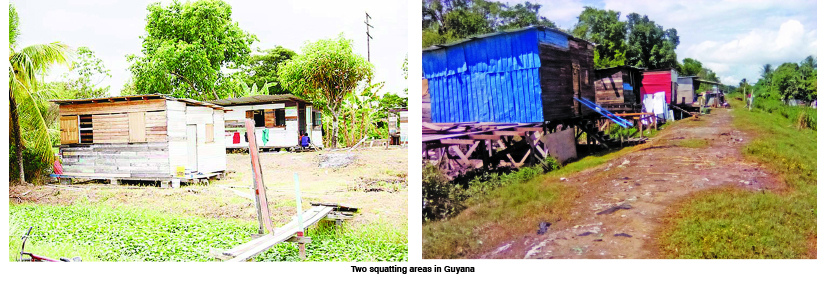Home News UN, Guyana collaborate to eradicate squatting by 2030
Guyana has forged an extensive collaboration with the United Nations-Habitat, which will seek to eliminate all informal settlements, commonly referred to as squatting, by 2030. 
This was the aim set out during the virtual launch of the Guyana Strategy for Informal Settlements Upgrading and Prevention (GSISUP) on Thursday thus enabling consultations within the next few months.
Statistic from a 2015 study which showed that 15 per cent of Guyanese were living in informal settlements. This translates to 27,570 households and over 100,000 people.
As such, there is need for intervention and mechanisms to prevent this number from growing. The plan is to ‘leave no one behind’ by introducing accessible housing, regularizing lands and upgrading dwelling areas.
UN Habitat Regional Director in Latin America and the Caribbean, Elkin Velasques during the virtual meeting noted that the scope of cooperation includes a database on the informal settlements in Guyana, a strategy to upgrade informal settlements and partnerships for financing and capacity building.
“From the UN Habitat’s perspective, this is of course a huge responsibility and privilege you have given to us in trusting our capacity, also our methodologies and you count on us to continue strengthening this collaboration…In South America particular, we are working in different countries on informal settlements support.”
Velasques added that when the strategy is implemented in Guyana, it can be used as a model in the Caribbean and other parts of the world.
“Guyana is taking this leadership and we are sure that what we can achieve in the implementation of this strategy is going to be a model for the Caribbean and other areas of the world. We are aiming at inspiring our interventions in other countries what we are now undertaking with you.”
These efforts locally entail a multistakeholder approach, prompting contributions from central government agencies, Food for the Poor, Guyana Inc., Housing and Water Ministry, private sector, utility companies, community-based organisations, academia, NGOs, municipalities and religious organisations among other stakeholders.
Some of the challenges regarding informal settlements are based on the paucity of data on the current extent of squatting in the country, need for improved monitoring of government reserves, greater coordination among agencies and the slow transfer rate of regularized areas.
Senior informal settlement upgrading expert Michel Frojmovic indicated that consultations will continue for the next couple of months in order to create a finalized strategy. GSISUP contributes to achieving Sustainable Development Goal 11 Target One, which speaks to access for all to adequate and safe housing.
“The global context for this strategy is to achieve a part of the sustainable development goals, particularly that focuses on housing and urban services and the issue of slums which is a global issue. Within 10 years, we’ll have access to basic housing, services and really look at formal settlements rather than future informal settlements,” Frojmovic lauded.
Government through the Housing Ministry and the Central Planning and Housing Authority (CHPA) are integrally involved in the process to create better infrastructure for the population.
